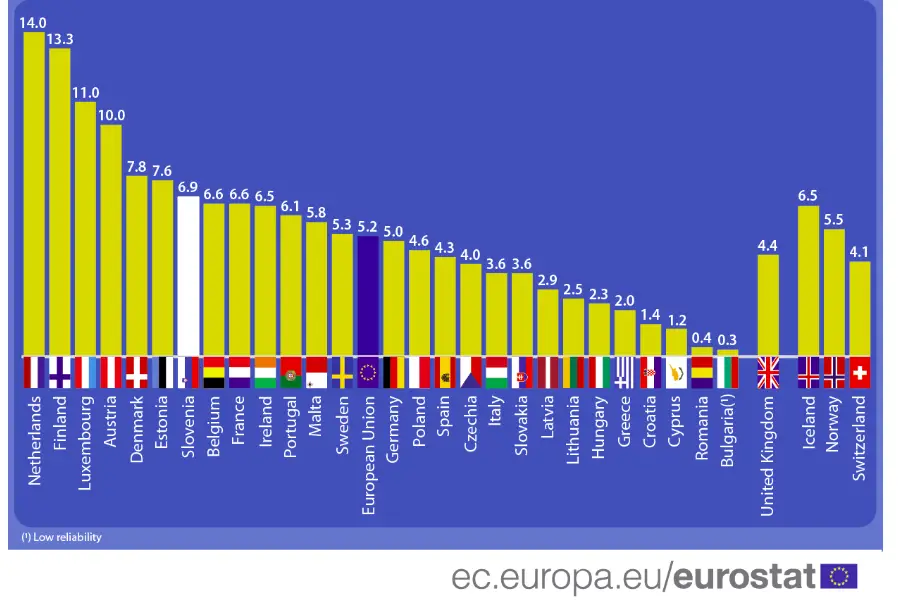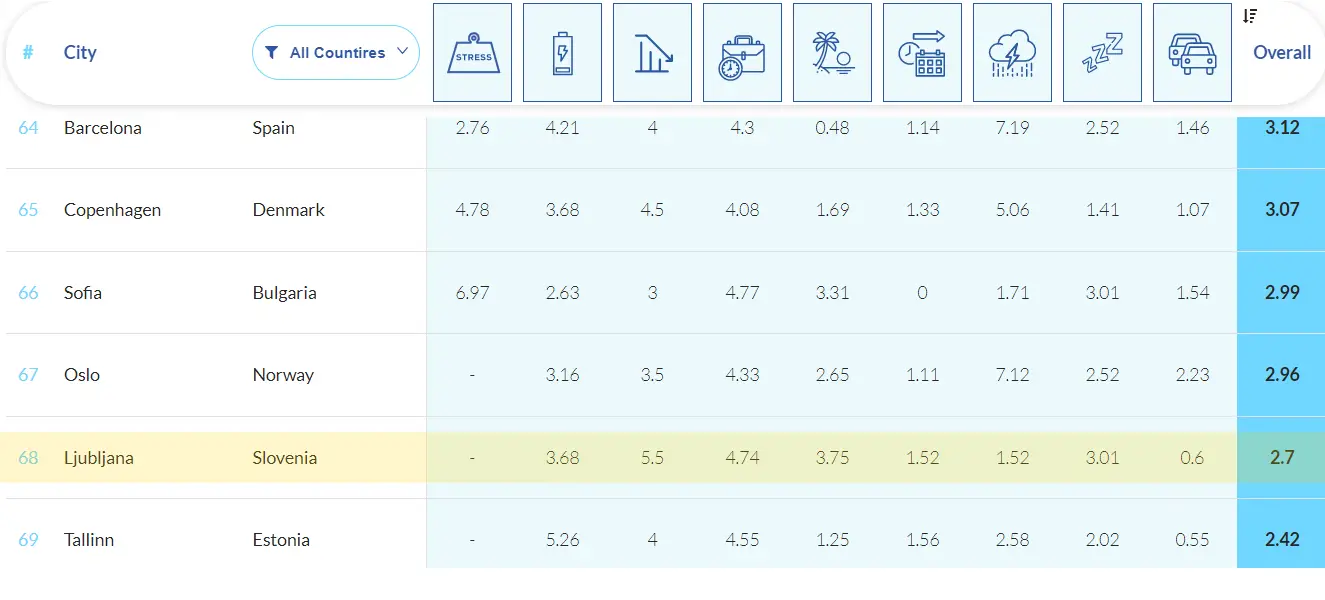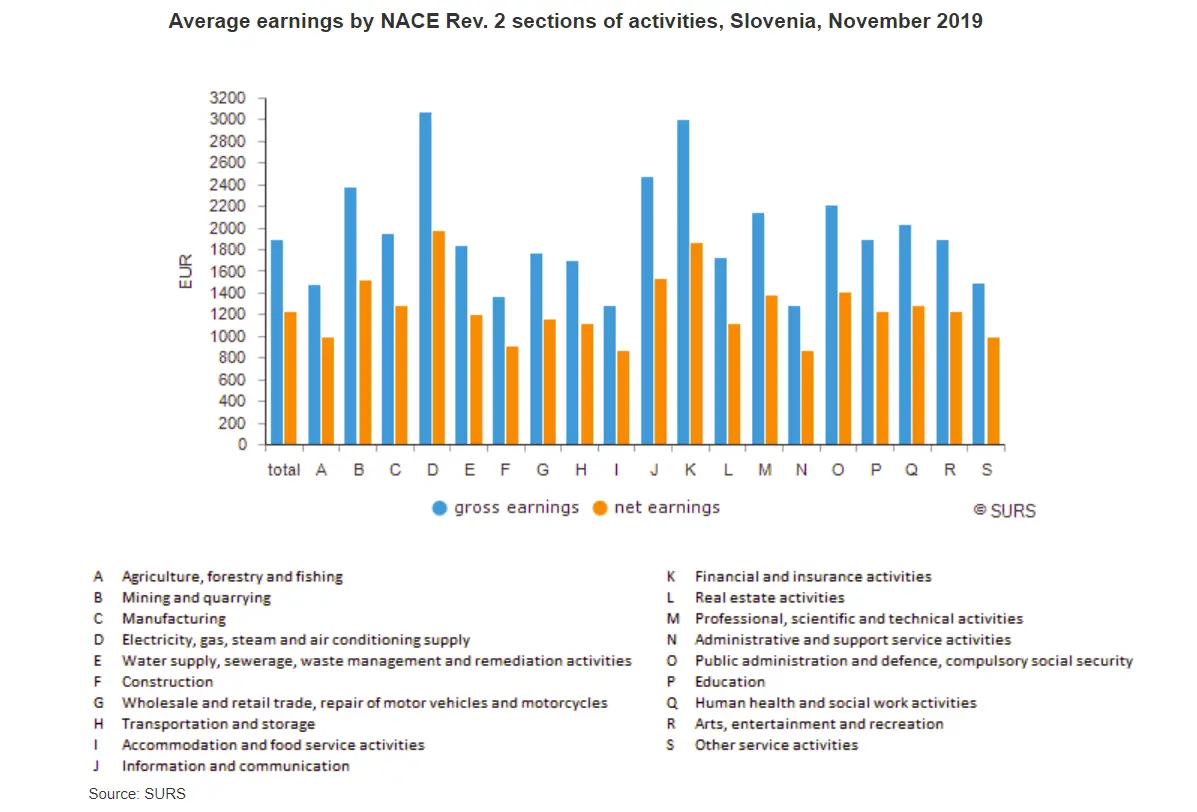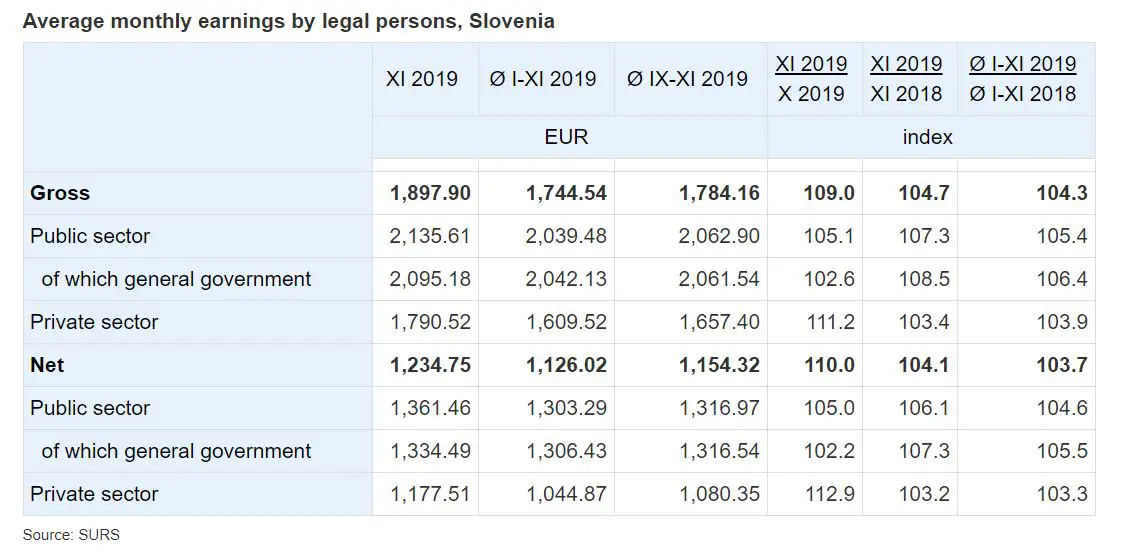Ljubljana related
STA, 8 July 2020 - Banka Slovenije has pointed out that the government's corona-crisis stimulus measures are having a marked effect on the labour market and that employment and wage statistics could deteriorate significantly once they are lifted. The central bank added that a deterioration on the labour market was also heralded by surveys conducted among companies.
Banka Slovenije's latest quarterly report, released on Wednesday, also says Slovenia suffered a strong decline in GDP in April, the prospects for the second half of the year are, however, more favourable.
The central bank pointed to a survey by the Statistics Office, which suggests demand will increase substantially in the third quarter, while it simultaneously projected a deterioration of the labour market situation in the second half of the year.
The financial situation of businesses meanwhile remains stable, which Banka Slovenia attributes to ample liquidity reserves, favourable bank financing, labour costs subsidies, the possibility of deferred tax payments, as well as the government's loan guarantees scheme.
On the other hand, the state's fiscal situation has deteriorated significantly. Revenue in the first five months decreased year-on-year by EUR 720 million or 9.2%, while expenditure was up by EUR 874 million or 11.4%.
The state deficit could reach around 8% of GDP this year, whereas public debt could rise to 2015 levels, when it stood at a record 82% of GDP.
STA, 15 June 2020 - The average net pay in Slovenia in April stood at EUR 1,266, which was 10.5% more than in March nominally and 11.5% more in real terms, the Statistics Office reported on Monday, noting that the increase was related to measures mitigating the impact of the Covid-19 epidemic.
The Statistics Office said the increase was mostly related to the payment of crisis bonuses in line with the relevant legislation and collective bargaining agreements.
The average gross pay was up by 10.2% nominally and by 11.2% in real terms compared to March to EUR 1,937.
In the public sector, the average gross pay for April was up by 10.9% on the monthly basis, while in the private sector, the increase was smaller, at 8.6%.
Sector-wise, the average gross pay was the highest in healthcare and social security (EUR 2,714), where the monthly increase was also the highest, at 27.9%.
Also increasing by more than a fifth was the average gross pay in the hospitality sector (24.2%).
STA, 9 June 2020 - Slovenia's exports dropped by 28.8% to EUR 2.01 billion in April compared to April 2019, the sharpest contraction since 2008, while imports plummeted by 41.2% to EUR 1.86 billion, the Statistics Office said on Tuesday. The trend was driven by a decline in car trade, which shrank by about three-quarters compared to last April.
Road vehicles are the third most traded group of products, preceded only by medical and pharmaceutical products, and electric machines and devices.
The surplus in external trade in goods reached EUR 149.3 million, which is the highest surplus in the last ten years, and the export/import ratio was at 108%.
Exports to EU countries amounted to EUR 1.24 billion, which is down 41.4% over April 2019, and imports to the EU topped EUR 1.18 billion, which is a 45.4% drop compared to last April.
Trade with all main foreign trade partners from the EU decreased, most notably with Italy and Germany. But the latter remains Slovenia's most important trade partner.
Exports to non-EU countries were up 9.3% to EUR 766.5 million, while imports from them were down 32.1% to EUR 680.4 million.
The year-on-year growth of exports to this group of countries was the result of higher exports to Switzerland, which thus became Slovenia's second most important trade partner.
In the first four months of 2020, exports decreased by 2.6% year on year to EUR 10.79 billion and imports by 9.4% to EUR 10.21 billion. External trade surplus in the January-April period topped EUR 585.8 million and the export/import ratio was 105.7%.
Employment outlook for Q3 worst since 2013
STA, 9 June 2020 - Employment company Manpower Group has presented a grim employment outlook for the third quarter of the year. In the wake of the coronavirus epidemic in Slovenia, the outlook presented on Tuesday is the worst since 2013. The share of employers planning layoffs surpasses those planning to hire by seven percentage points.
The survey showed that 18% of employers plan to lay off people between July and the end September, while 11% intend to expand their teams.
Seasonably adjusted, the gap between those planning to fire and those intending to hire amounts one percentage point.
Meanwhile, 64% do not plan to make changes to their workforce, Manpower data suggest.
The net hiring outlook for the next quarter is 5 percentage points lower than for this quarter, and 23 percentage points lower than for the same period last year.
A drop in hiring is expected by employers in five out of the seven sectors included in the survey, with the prospects being the worst in hospitality. Here, the hiring gap is as high as 13 percentage points.
The only two segments with positive hiring prospects are the sector of financial and business services and what is classified by Manpower as other production sectors.
In terms of company size, prospects are poorest among medium-sized companies, where net employment outlook is at -14%.
Employment outlook has deteriorated for all regions, with central Slovenia and the southeast faring worst. In central Slovenia the hiring gap reached 5 percentage points, while in the southeast it dropped to 1 percentage point.
The global survey included 388 Slovenian companies among a total of 34,600 companies in 44 countries.
STA, 22 April 2020 - The Chinese-owned group Hisense Europe is planning to close 2,200 jobs by the end of the year as a result of the coronavirus pandemic, including as many as 1,000 in Slovenia, TV Slovenija reported, citing a trade unionist.
According to the report, the management of household appliances maker Hisense Gorenje set its plans at a meeting featuring Chao Liu, one of the executive directors, production manager Tomaž Korošec, staffing officials and representatives of the works council, trade union and the employees' representative on the board Drago Bahun.
The management presented data on the situation resulting from the pandemic. Production in Velenje has not yet returned to full capacity after being completely suspended for three weeks.
The head of the in-house trade union Žan Zeba told the public broadcaster that Hisense was to make 1,000 people redundant in Slovenia, including 700 at the production facility in Velenje and 300 in the Ljubljana-headquartered company Hisense Europe.
Zeba said the staff were shocked by the extent of planned layoffs, noting that the company had received state aid "probably also in order not to make redundancies".
The first meeting with employees on layoffs are to be held after May day holidays.
Gorenje is to set out detailed plans about job cutbacks on Thursday.
STA, 17 February 2020 - Average monthly take-home pay in Slovenia increased last year by 3.7% in nominal terms and by 2.1% in real terms to EUR 1,133.50, fresh data from the Statistics Office show.
Average gross monthly pay for 2019 amounted to EUR 1,753.84, up 4.3% in nominal terms and up 2.7% in real terms compared to average monthly earnings in 2018.
Gross earnings in the private sector rose by 3.9% and those in the public sector by 5.4%, rising as much as 6.5% in the general government sector.
The growth in the public sector was largely due to a new pay deal negotiated in late 2018.
The highest monthly gross earnings for 2019 were paid in electricity, gas, steam and air conditioning supply; at EUR 2,628.55.
At 8.9%, the highest increase in pay was recorded in the public administration and defence, compulsory social security.
December pay amounted to EUR 1,855.25 gross, a decrease of 2.2% in nominal terms and 2% less in real terms than November pay. The drop is due to performance and Christmas bonuses paid out in November.
Net pay for December amounted to EUR 1,214.93, 1.6% lower nominally and 1.4% lower in real terms than earnings for November.
STA, 8 February 2020 - The share of Slovenians working from home is above EU average, with data released by Eurostat earlier this week showing that 6.9% of the employed Slovenians between 15 and 64 years of age usually worked from home in 2018.
The share in the EU was 5.2%, and had not changed much over the past decade. However, the share of those who sometimes work from home increased from 5.8% in 2008 to 8.3% in 2018.
Slovenia ranks 7th among the 27 member countries in terms of the share of those who work at home.
The Netherlands tops the list with 14% of the employed usually working from home, closely followed by Finland (13.3%), Luxembourg (11%) and Austria (10%).

Image from Eurostat, with Slovenia highlighted
The lowest proportions of those who usually work at home was recorded in Romania (0.4%) and Bulgaria (0.3%).
It is the self-employed who work from home most often with the share of such among them at 18.5% compared to only 3% among employees.
The highest rates of the self-employed usually working from home were recorded in Finland (46.4%), the Netherlands (44.5%) and Austria (43.6%).
The share of employed women usually working in 2018 was slightly higher than the share of men, at 5.5% and 5%, respectively.
The share of those working from home increases with age. In the EU, just 1.8% of 15-24 year-olds usually worked from home in 2018, compared to 5% among 25-49 year-olds and 6.4% among 50-64 year-olds.
More on this data can be found here
How does Ljubljana rate compared to other cities with regard to burnout and general stress among those in employment? A website that sells mattresses, Savvy Sleeper, recently commissioned an analysis that looked at nine different factors – work-related stress, employee presenteeism, lack of motivation at work, annual work hours, vacation time, working more than 48 hours a week, the prevalence of mental health disorders and substance abuse, getting less than 7 hours of sleep, and time spent commuting – and used data from sources such as Glassdoor, UBS and the International Labour Organization – to rank 69 cities, from those with the highest to lowest levels of burnout.
For anyone struggling in Šiška, exhausted in Vič, or feeling underemployed in Trnovo the results may come as a surprise, along with the shocking realisation that things could be worse. For others, who skip to work with a song in their hearts and sleep soundly at night, they’ll confirm that the city is one that manages to balance development with a slower, more manageable pace than in many other capitals, with life still lived on a human scale.

Screenshot: Savvy Sleeper
More specifically, out of 69 cities Ljubljana is said to have the second lowest level of burnout, with the related text on the best three being as follows:
The lowest scoring global city for work burnout is Tallinn, Estonia. The city offers a generous amount of vacation, with an average of 29.1 paid days off. Plus, just 5.6% of the population work more than 48 hours a week.
Ljubljana, Slovenia (68th) has the second-lowest risk of employee burnout. Just 5.5% of Slovenia’s population works more than 48 hours a week. While commuters spend only 27.93 minutes in traffic to and from work, compared to the average of all analysed cities, 40.10 minutes.
Oslo, Norway (67th) has been reported to be one of the happiest places in the world according to the World Happiness Report. Work-life balance is taken very seriously in Norway and just 4.2% of the entire population works 48 hours or more a week.
However, within this it should be noted that Ljubljana has relatively high levels of lack of motivation at work (#11), and that no data was obtained for work-related stress from Glassdoor for the city.
Looking at the end of the scale, the top 10 most stressed cities are said to be Tokyo, Mumbai, Seoul, Istanbul, Manila, Jakarta, Hanoi, Taipei, Los Angeles, and Buenos Aires, with seven of these being in Asia. Looking at the EU, the most stressed cities are London (at #14), Rome (#21) and Athens (29).
It’s an interesting list to consider as you think about the trade offs between living in a 24-hour cosmopolitan metropolis and a smaller city in a relative backwater, and the different opportunities they provide for development and peace of mind. You can see the full list, and more details, here.
STA, 15 January 2020 - Slovenia's average net pay for November was EUR 1,235, up by 10% in nominal terms and 9.9% in real terms compared to October and by 4.1% nominally year-on-year. The surge was due to extra payments at the end of year, such as Christmas and performance bonuses, shows the Statistics Office data released on Wednesday.
Meanwhile, the average gross pay rose by 9% nominally to EUR 1,898, up 8.9% in real terms compared to October.

The average gross extra payment in November amounted to EUR 724, with around 23% of employees receiving the sum, mostly level with 2018.
The November average net salary increased by 2.7% in real terms year-on-year. At a monthly level, the figure grew both in the private sector (+13%) and public sector (+5%), increasing the most in financial and insurance business (+24%).
Moreover, the average net pay for November grew in the electricity, gas and steam sector (+24%), where it was the highest (EUR 1,975), and in manufacturing (+17%).
You can learn more about the images on Slovenia’s euro coins here: Slovenia in your pocket – coins that celebrate the culture
STA, 5 December 2019 - Pharmaceutical company Lek has been declared the top Slovenian employer in 2019, the first time in nine years that it has beaten rival drug maker Krka. The title is awarded by the jobs portal Mojedelo.
The award is the result of a poll involving 19,000 users of the jobs portal that measured various aspects of the reputation of companies as employers or potential employers, Styria Digital Marketplaces, which owns Mojedelo, said on Thursday.
Lek and Krka were followed in the rankings by energy companies Petrol and Gen-I, and telco Telekom Slovenije.
Lek, which is owned by the pharma giant Novartis, said the award recognised "that we have created an environment for our colleagues in which everyone can find their inspiration".
All our stories about employment in Slovenia are here
STA, 25 November 2019 - Businesses from north-east Slovenia are worried that companies providing cross-border services in the EU could be severely affected if Slovenia introduces into its law the new directive governing cross-border services and posted workers "too rigorously". A study by an economist was presented to corroborate their view.
Earlier this year, the European Federation of Building and Woodworkers (EFBWW) asked the European Commission to investigate Slovenia for dumping in temporarily posting workers in other EU countries.
The EFBWW maintains Slovenia's law enables paying lower contributions and taxes for posted workers in the markets where they work, making them more competitive, explained the head of the Štajerska region's association of providers of cross-border services, Albert Kekec.
Related - Temporary Posting of Slovene Workers “Exports Cheap Labour” (Feature)
Slovenian companies believe these are false allegations, and have complained against them, waiting for the final decision, Kekec noted in Maribor on Monday.
He believes Slovenia was challenged because it is a small country and because it has a poor record of defending itself in such cases.
But since the dispute could result in case law which would also apply to other EU countries, it is important that our country realises the weight of the case and acts appropriately, he said.
This is why the regional Štajerska Chamber of Commerce has commissioned a study of exports of construction and engineering services, and posted workers.
Economist Jože P. Damijan, presenting his study, said legislative changes would considerably lower or entirely stop the export of construction, engineering and transport services by Slovenian companies to the EU.
This is particularly true for the part of Štajerska along the Drava river, which has an above-average number of such companies.
Damijan predicts a loss of more than 10,000 jobs around the entire country, and even up to 13,000 in the worst-case scenario, of which some 5,000 in the Drava area.
The chamber wonders whether the government is aware of all the consequences that could result from transposing the directive indiscriminately.
It points to direct and indirect impact on the country's GDP, while the area around the river Drava would be affected the most.
Damijan's study shows Slovenia's construction, engineering and transport companies generate around 20% of all exported services, and almost 4.5% of the country's overall exports. The majority or 80% is exported to the EU.
These companies employ more than 70,000 workers and post around 12,000 workers abroad monthly. Slovenia is thus preceded only by Poland.
Over the past few years Slovenia's services sector has been growing the fastest in the EU.
Damijan said it was true the three sectors employed over 70% of foreign workers, mostly from the Balkans, but noted these were still Slovenian-owned companies paying taxes in Slovenia.
The chamber also criticised the government for not providing enough information, including about the appeal against the EFBWW's request to investigate Slovenia.
State Secretary at the Labour Ministry Tilen Božič has recently said the ministry intends to tackle the issue of posted workers, including alleged violations of worker rights as highlighted by Slovenian trade unions, by changing the law on cross-border services "in a foreseeable future".





